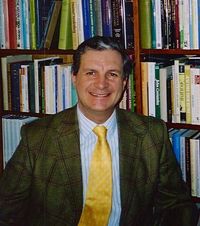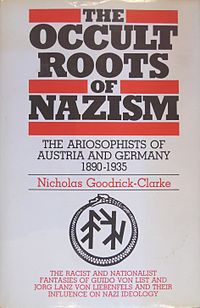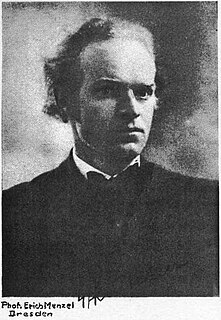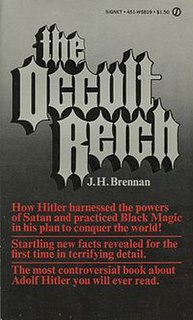The Thule Society, originally the Studiengruppe für germanisches Altertum, was a German occultist and Völkisch group founded in Munich shortly after World War I, named after a mythical northern country in Greek legend. The society is notable chiefly as the organization that sponsored the Deutsche Arbeiterpartei, which was later reorganized by Adolf Hitler into the National Socialist German Workers' Party. According to Hitler biographer Ian Kershaw, the organization's "membership list ... reads like a Who's Who of early Nazi sympathizers and leading figures in Munich", including Rudolf Hess, Alfred Rosenberg, Hans Frank, Julius Lehmann, Gottfried Feder, Dietrich Eckart, and Karl Harrer.
Karl Maria Wiligut was an Austrian occultist and SS-Brigadeführer.
The Völkisch movement was a German ethno-nationalist movement active from the late 19th century through to the Nazi era, with remnants in the Federal Republic of Germany afterwards. Erected on the idea of "blood and soil", inspired by the one-body-metaphor, and by the idea of naturally grown communities in unity, it was characterized by organicism, racialism, populism, agrarianism, romantic nationalism and – as a consequence of a growing exclusive and ethnic connotation – by antisemitism from the 1900s onward. Völkisch nationalists generally considered the Jews to be an "alien people" who belonged to a different Volk than the Germans.
The Germanenorden was an occultist and völkisch secret society in early 20th-century Germany. Its aim was to monitor Jews and spread antisemitic material.

Guido Karl Anton List, better known as Guido von List, was an Austrian occultist, journalist, playwright, and novelist. He expounded a modern Pagan new religious movement known as Wotanism, which he claimed was the revival of the religion of the ancient German race, and which included an inner set of Ariosophical teachings that he termed Armanism.
Mannus, according to the Roman writer Tacitus, was a figure in the creation myths of the Germanic tribes. Tacitus is the only source of these myths.
The association of Nazism with occultism occurs in a wide range of theories, speculation and research into the origins of Nazism and into Nazism's possible relationship with various occult traditions. Such ideas have flourished as a part of popular culture since at least the early 1940s, and gained renewed popularity starting in the 1960s. Books on the topic include The Morning of the Magicians (1960) and The Spear of Destiny (1972). Nazism and occultism have also been featured in numerous documentaries, films, novels, comic books, and other fictional media. Notable examples include the film Raiders of the Lost Ark (1981), the Wolfenstein video game series, and the comic-book series Hellboy (1993-present).

Nicholas Goodrick-Clarke was a British historian and professor of Western esotericism at the University of Exeter, best known for his authorship of several scholarly books on the history of Germany between the World Wars, esoteric and occult traditions.

The Occult Roots of Nazism: The Ariosophists of Austria and Germany, 1890-1935 is a book about Nazi occultism and Ariosophy by historian Nicholas Goodrick-Clarke, who traces some of its roots back to Esotericism in Germany and Austria between 1880 and 1945. The foreword is by Rohan Butler, who had written The Roots of National Socialism in the 1930s. The book is based on Goodrick-Clarke's 1982 Ph.D. thesis The ariosophists of Austria and Germany 1890-1935: Reactionary political fantasy in relation to social anxiety.

The Armanen runes are a series of 18 runes, closely based on the historical Younger Futhark, introduced by Austrian mysticist and Germanic revivalist Guido von List in his Das Geheimnis der Runen, published as a periodical article in 1906, and as a standalone publication in 1908. The name Armanen runes associates the runes with the postulated Armanen, whom von List saw as ancient Aryan priest-kings.

Armanism and Ariosophy are esoteric ideological systems that were pioneered by Guido von List and Jörg Lanz von Liebenfels respectively, in Austria between 1890 and 1930. The term 'Ariosophy', which means the wisdom of the Aryans, was first coined by Lanz von Liebenfels in 1915 and in the 1920s, it became the name of his doctrine. In research on the topic, such as Nicholas Goodrick-Clarke's book The Occult Roots of Nazism, the term 'Ariosophy' is generically used to describe the Aryan-esoteric theories of a subset of the 'Völkische Bewegung'. This broader use of the word is retrospective and it was not generally current among the esotericists themselves. List actually called his doctrine 'Armanism', while Lanz used the terms 'Theozoology' and 'Ario-Christianity' before the First World War.
The Armanen-Orden was founded as a revival of the Ariosophical Guido von List Society by German occultist Adolf Schleipfer and his then-wife Sigrun von Schlichting.

Black Sun: Aryan Cults, Esoteric Nazism and the Politics of Identity is a book by the historian Nicholas Goodrick-Clarke, in which the author examines post-war Nazi occultism and similar phenomena.

Siegfried Adolf Kummer was a German mystic and Germanic revivalist. He is also most well known for his revivalism and use of the Armanen runes row. He, along with Friedrich Bernhard Marby, were imprisoned during the Third Reich for being unauthorised occultists.
Friedrich Bernhard Marby was a German rune occultist and Germanic revivalist. He is best known for his revivalism and use of the Armanen runes. Marby was imprisoned during the Third Reich, which may have been due to a denunciation by Karl Maria Wiligut. According to the Odinist magazine Vor Trú, Marby "was one of the most important figures in the realm of runic sciences" with an impact felt not only by contemporaries but "among today's researchers and practitioners."

The Occult Reich is a 1974 book about occultism during the Third Reich by J. H. Brennan.
The Occult History of the Third Reich, narrated by Patrick Allen and directed by Dave Flitton, is a 1991 four-part History Channel documentary regarding the occult influences and history of Nazi Germany and early 20th century Germany.
This article gives an overview of esoteric movements in Germany and Austria between 1880 and 1945, presenting theosophy, anthroposophy and ariosophy, among others, against the influences of earlier European esotericism.
Gregor Schwartz-Bostunitsch was a prominent figure in Nazi Germany. He was a German-Russian author in the völkisch movement and became SS-Standartenführer in 1944. His death is unclear.
Historians, political scientists and philosophers have studied Nazism with a specific focus on its religious and pseudo-religious aspects. It has been debated whether Nazism would constitute a political religion, and there has also been research on the millenarian, messianic, and occult or esoteric aspects of Nazism.






